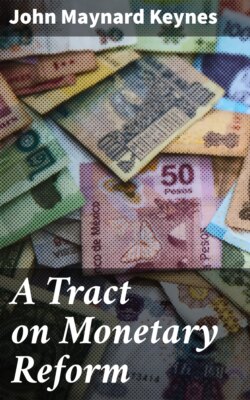Читать книгу A Tract on Monetary Reform - John Maynard Keynes - Страница 3
На сайте Литреса книга снята с продажи.
PREFACE
ОглавлениеTable of Contents
We leave Saving to the private investor, and we encourage him to place his savings mainly in titles to money. We leave the responsibility for setting Production in motion to the business man, who is mainly influenced by the profits which he expects to accrue to himself in terms of money. Those who are not in favour of drastic changes in the existing organisation of society believe that these arrangements, being in accord with human nature, have great advantages. But they cannot work properly if the money, which they assume as a stable measuring-rod, is undependable. Unemployment, the precarious life of the worker, the disappointment of expectation, the sudden loss of savings, the excessive windfalls to individuals, the speculator, the profiteer—all proceed, in large measure, from the instability of the standard of value.
It is often supposed that the costs of production are threefold, corresponding to the rewards of labour, enterprise, and accumulation. But there is a fourth cost, namely risk; and the reward of risk-bearing is one of the heaviest, and perhaps the most avoidable, burden on production. This element of risk is greatly aggravated by the instability of the standard of value. Currency Reforms, which led to the adoption by this country and the world at large of sound monetary principles, would diminish the wastes of Risk, which consume at present too much of our estate.
Nowhere do conservative notions consider themselves more in place than in currency; yet nowhere is the need of innovation more urgent. One is often warned that a scientific treatment of currency questions is impossible because the banking world is intellectually incapable of understanding its own problems. If this is true, the order of Society, which they stand for, will decay. But I do not believe it. What we have lacked is a clear analysis of the real facts, rather than ability to understand an analysis already given. If the new ideas, now developing in many quarters, are sound and right, I do not doubt that sooner or later they will prevail. I dedicate this book, humbly and without permission, to the Governors and Court of the Bank of England, who now and for the future have a much more difficult and anxious task entrusted to them than in former days.
J.M. KEYNES.
October 1923.
